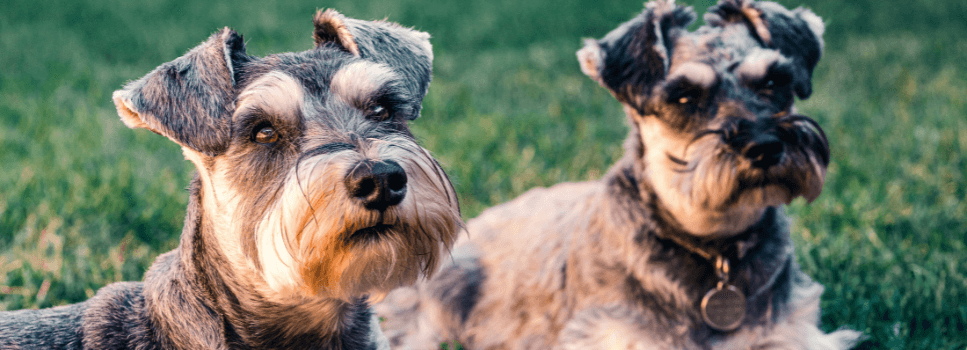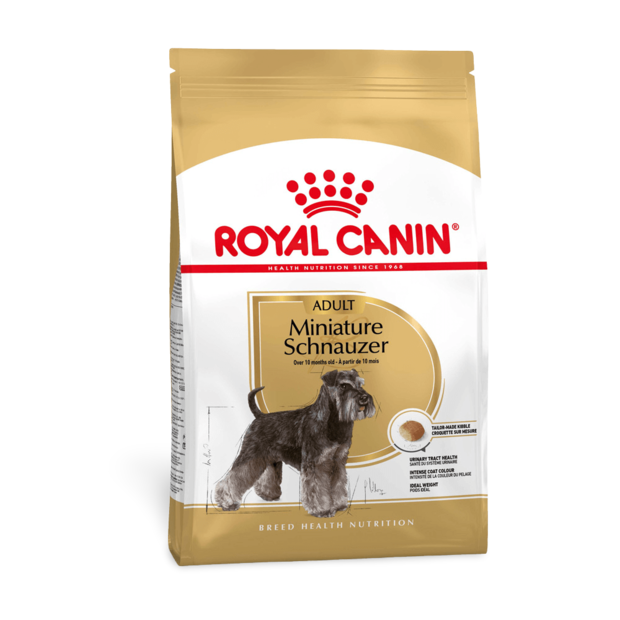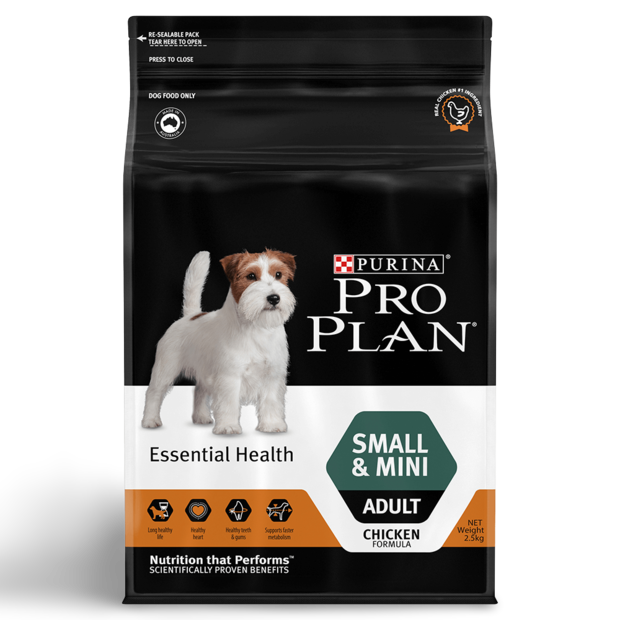Schnauzer
A complete breed guide for Schnauzer dogs
This article is written by Pet Circle veterinarian,
Schnauzer dogs are instantly recognisable for their thick, bushy eyebrows and beard. Their name comes from the word "snout" in German ("Schnauze"), affectionately referring to their hairy snouts which look like moustaches. A gentlemanly breed!
Contents
At a glance
Schnauzer breeds
History
Personality
Health Concerns
Nutrition
Grooming
Related Breeds
Further reading
Facts about the Schnauzer

| Breed size: | Place of origin: | Other names: |
| Miniature, Standard, Giant | Germany | Zwergschnauzers, Mittelschnauzers, Riesenschnauzers |
| Breed group: | Energy level: | Weight range: |
| Working | High | Miniature: 7-8kg, Standard: 14-20kg, Giant: 34-43kg |
| Life expectancy: | Tendency to bark: | Height range: |
| 12 - 14 years | Moderate | Miniature: 33-35cm, Standard: 47-50cm, Giant: 65-70cm |
| Drool factor: | Coat length: | Colours: |
| Low | Medium | Pepper and salt, Black, Silver |
| Shedding factor: | Social needs: | Overall grooming needs: |
| Low | Moderate | High |
Do Schnauzer shed?
Schnauzers are low shedders and are therefore a good breed for people with allergies. These dogs have a double coat which will require regular grooming. The recommended frequency of grooming is at least twice a week.
How big do Schnauzers get?
The Giant Schnauzer can weigh up to 43kg! When deciding on which breed to get, first consider the space you have available in your house and the size of your yard. Would it be more suitable to have a standard or miniature schnauzer instead if you have limited space?
Are Schnauzer good pets?
Schnauzers are loyal and fun companion dogs. They are great family pets with a big personality.
Do Schnauzers bark?
As a working breed, Schnauzers tend to tell you about everything that's going on. But with any dog breed, training is essential to discourage excessive barking. See our guide on How to Stop Your Dog Barking.
How much does a Schnauzer puppy cost?
A Schnauzer puppy could cost from $1000 to 3000 or more. A reputable breeder with highly sought after pups will cost much more than a pup from a rescue group.
How long do Schnauzers live for?
The life expectancy of Poodles ranges between 12-14 years. Generally, the larger the breed, the lower the life expectancy, so Giant Schnauzers will have a life expectancy closer to 10 years, while Miniature Schnauzers closer to 14 years.
How do I know which Schnauzer Breeder to choose?
Choosing a reputable breeder is a crucial initial step in bringing home a healthy, happy dog. Take a look at How to find a good breeder for questions you should be asking of any breeder. Responsible breeders should be committed advancing the health of their Schnauzer breed, pairing dogs to breed away from inheritable diseases and conformation issues, and selecting for good temperaments.
Schnauzer Breeds
There are 3 officially recognised Schnauzer breeds, one in each size! The breeds are: Standard Schnauzer, Miniature Schnauzer, and the Giant Schnauzer. The Miniature and Giant Schnauzer breeds were both developed from the original Standard Schnauzer.



Schnauzer History
There is evidence that this particular breed appeared way back in the 14th century in Germany. The Schnauzer made its appearance in the paintings of Durer and Rembrandt, and there is even a statue in Mechlinburg of a Schnauzer dog working alongside his human. Schnauzers were widely used as guard dogs, protecting the farmer's carts at the market as well as their human family. They were also excellent on the farms, eliminating rats and herding livestock.
Schnauzer Personality

The Schnauzer is an energetic dog. They are exceptionally intelligent and easily trained, with high reliability and loyalty. These breed characteristics are what made them suitable for work as personal guard dogs and companions.
The Schnauzers high spirits and energy means that they will need plenty of exercise. Lots of walks and play time must be provided. If the Schnauzer does not get enough physical and mental stimulation, they can easily become a pest in the house from their boredom and restlessness. Chasing the kids, running through the house, and getting in everyone's way can be how they show their frustrations. Getting them to play dog sports like frisbee or agility can be a good workout for a Schnauzer. Find a local club here on the Agility Dog Association of Australia (ADAA) website.
Schnauzer Health Problems
This breed is generally healthy and hardy. Schnauzers can still be prone to a few hereditary issues.
Hyperlipidemia
This is a condition where there are abnormally high levels of fat in the blood. These include cholesterol and triglycerides. In a study investigating the prevalence of hypertriglyceridemia in Miniature Schnauzers, it was found that nearly a third of the study group had triglyceride concentrations that were higher than the reference range for healthy dogs.
Pancreatitis
Pancreatitis in dogs occurs when there is inflammation of the pancreas, responsible for the production of digestive enzymes and insulin. Risk factors include a high fat diet, obesity and trauma to the organ. Since Schnauzers are prone to hyperlipidemia, it is thought this condition may be associated with symptoms of pancreatitis.
Cataracts
Often occurring in our senior pets, cataracts cause clouding of the lens and will lead to vision loss as the impaired lens affects the passage of light to the retina. In a healthy eye, light passes through the lens and focuses on the retina to send a sharp image to the brain. Causes of cataracts are often hereditary, but also include diabetes, advanced age, trauma, or retinal disease.
Liver Shunts
Miniature Schnauzers are at risk of liver shunts. Portosystemic shunts are abnormalities of the vascular system where the blood vessels carrying protein and nutrients are bypassing the liver, going directly into the systemic circulation instead. Most portosystemic shunts are congenital. Dogs and cats with this condition tend to have smaller than normal livers as their liver development is impaired with the lack of nutrients.
Urinary Stones
This breed has a predisposition to forming bladder stones in dogs, usually struvite or calcium oxalate. Bladder stones, especially calcium oxalate stones, require surgery to remove. Medical management afterwards is lifelong and involves using a prescription diet to reduce the risk of occurrence.
Schnauzer Diet and Nutrition

Schnauzer Puppies
Schnauzers come in all three sizes - small, medium and large. As a general rule of thumb, it is best to select a premium food that is specifically formulated for dogs in that size group. For example, Giant Schnauzers will do best on a large breed puppy food as they contain an appropriate balance of calcium and phosphorus with a lower overall calcium content for optimal bone and joint development. These are also less energy dense to reduce the risk of overfeeding as obesity is an important risk factor for the development of orthopaedic disease. Large breed puppies take longer to develop and will need to stay on puppy food until they are 15 - 18 months of age. Standard Schnauzers can be fed a medium breed dog food and once your puppy reaches 12 months of age, you can transition onto an adult diet.
For more information, take a look at What is the Best Puppy Food? and for answers to all your puppy feeding questions, check out Everything You Need to Know about Feeding Your Puppy.
Bring home a puppy is an exciting time, though it can be overwhelming with so many things to learn about puppy care, behaviour and training. Take a look at our New Puppy Guide to help you prepare for those first few weeks and months with your new family member. For tips on combatting some of those problematic (but entirely normal) puppy behaviours like inappropriate chewing by your dog.
With their intelligence and social nature, puppy preschools offer a safe environment to introduce your Schnauzer puppy to new people, smells, sounds, environments and other dogs. Puppy preschool also introduces the techniques used in positive obedience training. For more information, take a look at the Importance of Socialisation.
For adult Schnauzers, age-appropriate diets formulated for their specific size are ideal.
For more information have a look at What is the best dog food for Schnauzers?
Nutrition for Miniature Schnauzer Puppies
The following diets are premium quality foods, with highly digestible ingredients. They are designed to not only meet the needs of your growing Miniature Schnauzer, but allow them to thrive through additional ingredients such as omega 3 fatty acids (to ensure optional brain and eye development).
Nutrition for Miniature Schnauzer Adults
For more information have a look at our vet recommended best dog foods for Schnauzers
.Related Breeds
Keeshond
Originally used as a barge watchdog in Holland, this Dutch breed sports a famously thick coat and thought to have descended from the same lineages that produced the Samoyed, spitz and Norwegian elkhound. Keeshonds were bred with Pinschers to create the Standard Schnauzer.
Great Dane
Well known as one of the largest dog breeds in the world, it was once a guard dog for German nobility. Great Danes originated from hunting dogs descended from mastiffs and thought to have been crossed with greyhounds to give them their slender and agile build. The Great Dane was used to create the Giant Schnauzer breed to herd their cattle.
Poodle
Poodles started off as water retrievers but due to their quick intelligence, they expanded from hunting dogs to performing with circuses and travelling troops. It was in the French circuses, that the breed was selectively bred to create a much smaller sized version, what we now know as Miniature Poodles.
Affenpinschers
The Affenpinscher is a small dog bred for hunting rodents. Due to this instinct, this breed is generally not suited to a family with other small pets like rats or guinea pigs. These dogs are described by the French to be the "moustached little devil" or as they say, "diablotin moustachu"!
Further reading
Premium pet food: Is it worth it?
Does your dog have a food allergy?
How to read the label on a bag of pet food
Want to know more? Check out our Discover Page for more tips from our expert Vets on keeping your pets happy and healthy.































